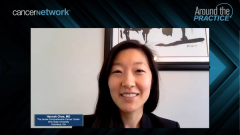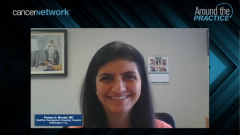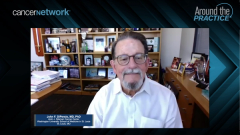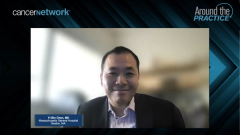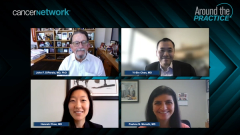
Perspectives on COVID-19 Prophylaxis and Vaccination
To close the discussion, panelists reflect on their practices’ guidance on long-acting antibody prophylaxis and vaccination against COVID-19 for patients with graft-versus-host-disease (GVHD).
Episodes in this series

Transcript:
John F. DiPersio, MD, PhD: The last question I had is not related to chronic GVHD [graft-versus-host disease] but involves these patients. What are you doing for patients who are out a year or 2 and grafted but develop chronic GVHD on low levels of immunosuppression, maybe a JAK [janus kinase] inhibitor, etcetera, for COVID-19? Are you just vaccinating them and watching them? Are you vaccinating them and watching their anti-COVID-19 spike protein antibody titers or are you actually giving them EVUSHELD even though they're far out and they may only be on a JAK inhibitor? Pashna?
Pashna N. Munshi, MD: In our program, with our ID [infectious disease] colleagues, we decided that all our immune-compromised patients, whether they're within 100 days or out 1 year or 2 years, all of them are getting the EVUSHELD protection. Obviously, if they're chronic GVHD patients by now, we hope that they've already been vaccinated and had their booster and then we are checking the spike protein level in their body for antibody response. And then, what I'm seeing is happening is that our ID colleagues are recommending that they have to alternate between their shield and then another booster down the road to keep their levels up. And thus, we're trying to do that for our patients.
John F. DiPersio, MD, PhD: It sounds like your ID people are as confused as ours. What are you doing in MGH [Massachusetts General Hospital]?
Yi-Bin Chen, MD: We don't have an organized algorithm partly because it's such a rapidly changing environment. When certain antibodies we had now don't work based on strain and then access to these things has been somewhat restricted and centrally managed and not at the discretion of, say, me. I think that in general, I worry about our long-term chronic GVHD patients more than any other transplant population because most of our fresh transplant patients now are receiving grafts from vaccinated donors. And there's some adaptive immunity that's transferred, whereas these chronic GVHD patients who are transplanted years ago never had any immunity against COVID-19. And if they're on immunosuppression like the drugs we listed, they certainly have an impaired ability to respond.
Thus, I worry about them the most. Thankfully, that the strains present right now seem to have become less severe and that's been helpful. But from an immunity perspective, we obviously recommend vaccination but there is what we've experienced and I'm sure you've seen what has been reported as well as the flares of chronic GVHD that can happen with any vaccine. Not just COVID-19 but vaccines certainly seem to trigger a severe inflammatory response. That for some of our patients they've experienced severe flares of chronic GVHD. We do give EVUSHELD, certainly, and then we do measure the spike antibodies and then we have trials coming up using other monoclonal antibody products as well. It's unfortunate because we don't have an organized treatment algorithm but that's also because of how fast this is changing.
John F. DiPersio, MD, PhD: Hannah, maybe you can answer this last response for the panel today. What are you doing at [The] Ohio State University?
Hannah Choe, MD: For the COVID-19?
John F. DiPersio, MD, PhD: Yes.
Hannah Choe, MD: It's a mix of the same thing. We certainly hinge everything on vaccination as much as possible so regardless of the immunosuppression and understanding that ruxolitinib and other immunosuppressants we were using limit the patient's ability to mount a response; we're still giving the 3 full doses plus a booster. And then, probably shortly here, we are going to be giving another booster once the FDA [Food and Drug Administration] approves that. And then, in certain cases, depending on patient history, considering EVUSHELD. We are not broadly using EVUSHELD and for the same reason that Yi-Ben just mentioned is that we are not sure about the efficacy with the current strain and future strain, etcetera.
John F. DiPersio, MD, PhD: I think it's also that the EVUSHELD studies were done in immunocompetent patients and so there's no extension. You can't make an obvious extension into our patients, but it's well tolerated, and I do agree with you, Yi-Bin. Even with regular vaccinations as well as with the COVID-19 vaccinations, there can be significant flares in chronic GVHD, and it's always been one of my pet peeves about the regular vaccinations. Really, how much benefit are we doing especially if you have a one in 10 out of patients that have a real flare in their chronic GVHD? In any event, we do it obviously and we see the same thing with the covert vaccinations and so I do use EVUSHELD on these patients because I do think that they're immunocompromised for a long time, years and years after transplant, especially if they're on immunosuppression. But I have no evidence that this is protective, especially in this population of patients.
I've really enjoyed listening to the panel's responses to these questions and teaching me about chronic GVHD and acute GVHD. It's been a great hour and I really want to first and foremost thank Pashna, Yi-Bin, and Hannah for their participation in this panel. You guys were great, and I really learned a lot and I want to thank the viewing audience for sticking with us for the last hour. And I hope that you've been provided with some helpful insights and some hints about how to manage this very difficult disease to both diagnose and treat. And with that, I'll bid you all adieu. Thank you very much.
Transcript edited for clarity.
Newsletter
Stay up to date on recent advances in the multidisciplinary approach to cancer.


